Food, Water, and Shelter: Basic Needs in the West Bank Under Threat of Settler Violence.
Part One: Food Insecurity in the West Bank
It’s 6 a.m. A small, unassuming hybrid vehicle pulls into a public parking lot in Jerusalem. Driving the car, is Dr. Amiel Vardi, a professor at the Hebrew University of Jerusalem and an activist on behalf of Palestinian rights. A foremost expert in Closed Military Zones, he has dedicated his life to exposing the injustices of the Israeli occupation in the West Bank.
Constantly on the phone, Amiel communicates information to activist groups, coordinates with international human rights watch groups like B’Tselem, and works with NGOs to facilitate various types of aid to be brought to Palestinian villagers.
Each day offers a new challenge for him and the activists he works alongside, but he insists that all of the attention be focused towards Palestinians. Unaware of the day’s trajectory, Amiel outlines his plans: swap to a car with four wheel drive to traverse unpaved and occasionally blocked roads, oversee the safe passage of Palestinian goat herders on their own property, and offer me insight into the layout and history of the Masafer Yatta area. He describes what the activists do as very amorphic. “No one organization, institution, or group, remains the same for very long.”
Brendan: “In your history of offering and organizing protective presence, how effective has it been in stopping infractions on Palestinians by settlers?”
There is a short pause for some time as he drives down the road. He points out an Israeli settlement that boasts an expansive cattle farm and bright green crops atop a hill that was once Palestinian land.
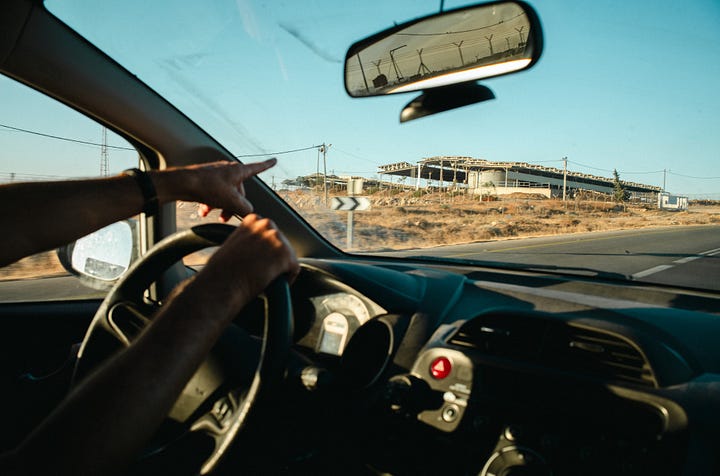
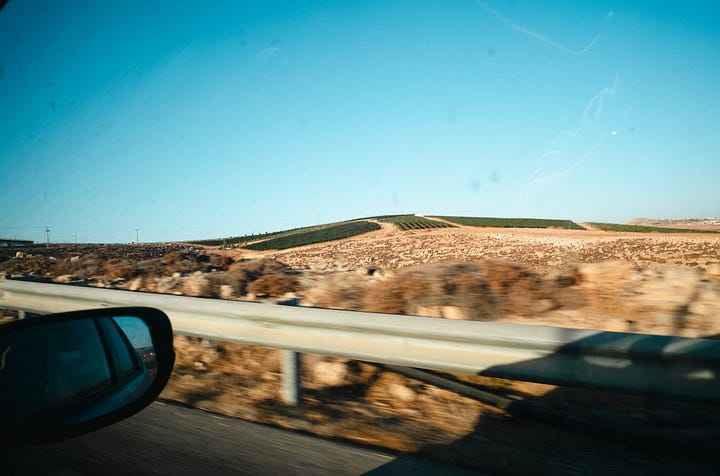
Amiel: “I’m hesitating for an answer. Not because I don’t have one, but because I am superstitious. Post October 7th, it took us a while to get back to full scale activism and a point you could consider protective presence. — But it works. Not on its own, but it works. With large activist groups, international press, and work in the courts.”
B: “On a normal day, how many activists are you able to bring together for protective presence?”
A: “Due to shortages of people, we have to make decisions of what to protect which is not an easy decision.”
Amiel lets out a disheartened chuckle at the prospect of his last statement. For those living in occupied territories who rely on protective presence to maintain some semblance of normal daily life, fewer activists is a grim reality.
A: “Since the court system, soldiers need approval from a brigadier general to close Palestinian land.”
The land closure Amiel is referring to is the process by which soldiers come into a village where reports of settler violence occur, clear the land of all civilians, and close entry for 24 to 48 hours. In cases such as this, Palestinians are forced to leave their land, but settlers - who are primarily former IDF, reservists, and active soldiers - may continue to roam the land freely. As they do not necessarily fit the convenient description of civilian.
In the West Bank, Palestinians rely heavily on what the Palestinian Ministry of Agriculture refers to as “small-scale family farming” to survive. In February of 2024, the International Law Commission (ILC) found that “50% of vegetable farmers were denied access to their land at least once since [October 7th.]” These land closures -which are only actively enforced against Palestinians living in the occupied West Bank - directly restrict their ability to tend to their farms, livestock, and food supply.
Land closures however, aren’t the only means by which the IDF and Israeli settlers attack Palestinian’s food supply. Within the past year, an uptick in the use of sheep and goat herds by settlers offers new means to destabilize food security of Palestinians. The intentional grazing of settler livestock on villagers’ property has three additional externalities which serve as attempts to starve out Palestinians from their homes.
By bringing their livestock to feed on grass which belongs to villagers, settlers are able to make edible grass for Palestinian livestock less available. If they succeed in overgrazing the land, villagers have two choices. They can try to move from their homes to new grazing lands (a process that is next to impossible due to the region’s restricted travel conditions for Palestinians.) Or they can stay put and allow their goats starve thus furthering their own food insecurity
By leading their herds towards agricultural crops cultivated for food at home, settlers can destroy villagers’ agricultural fruits. Palestinians grow crops which are primarily comprised of native plants for personal consumption. These include but are not limited to, olives, grapes, and figs. The latter of which is incredibly popular for activists to plant due to its ability to reliably yield fruit in arid climates.
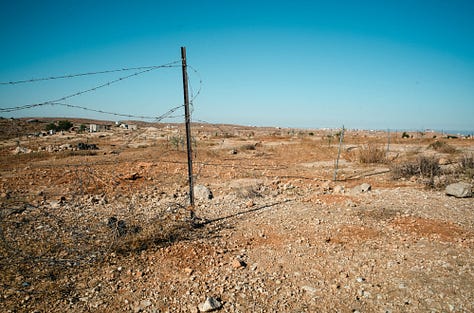
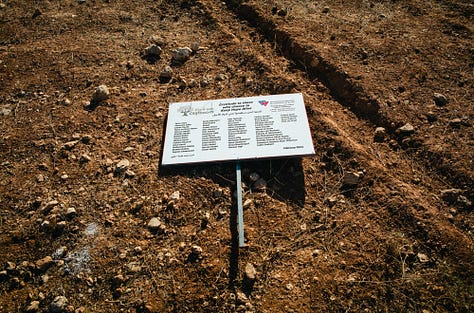
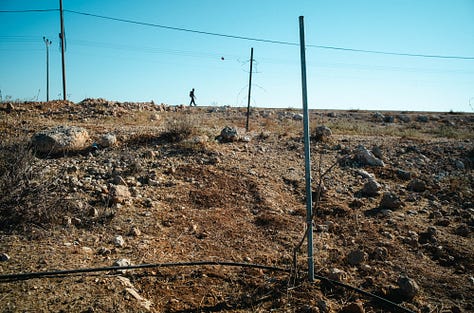
A field containing the remains of olive trees funded by the Joint Advocacy Initiative. The fence around the field has been clipped, allowing settler livestock grazing access to the vulnerable trees. The final, and least work intensive method, is by mixing herds. In the past year, herd mixing proved to be one of the most effective means by which to steal Palestinian livestock. Settlers lead their herds onto Palestinian lands, allow the herds to mix, and take the mixed group of the livestock back into their cattle outposts where they remain unquestioned by the police or IDF in the region. In the eyes of these two authorities, possession is nine tenths of the law
In what may seem like a solution, Palestinians are able to report these acts of violence to the international justice community. But like many things in the West Bank, the influence of the IDF and settlers wishing to do villagers harm is well within the picture. In order to officially log each case, the International Committee of the REd Cross (ICRC) has to file a report with the District Commissioner to create a paper trail of events which happened. The same District Commissioner is primarily staffed by former, reservist, and active IDF soldiers many of whom are settlers. This creates an environment in which an innumerable amount of violence goes entirely unreported for fear of reprisal.

While each case of settler violence varies and the degree to which justice is or is not doled out, one factor remains constant: each act of settler violence is an affront to Palestinian food, water, and shelter - the very foundation of survival.
NOTE TO READERS: This Substack is part one of a three part series titled Food, Water, and Shelter: Basic Needs in the West Bank Under Threat of Settler Violence.
Additionally, I will be writing short updates on the other spot stories in between, but this series will likely take me much longer due to the amount of research I am dedicating to on top of interviews, photographs, and writing. Please feel free to email corrections or concerns to substack@brendanrains.com or just leave a comment!
Best,







Great pictures
There is a video in sm of settlers throwing beer on someone in a car...is that your video?